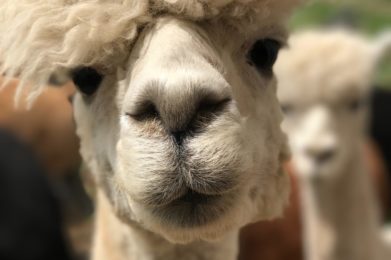
Our Alpaca Services at a Quick Glance:
- 5 in 1 Vaccines
- Faecal Egg Counting
- Vitamin D Injections
- Castration
- Dental Care
- Medical & Surgical Services
- General Health Care Management
- Ultrasound Scanning
- Breeding Programmes & Cria Care
Alpacas are a popular addition to lifestyle farms. They make great pets and produce a soft fibre which is often compared to fine merino and cashmere.

Vet Services are lucky to have a number of alpaca interested vets who offer a comprehensive range of alpaca care, including preventative treatments, general management advice, and medical & surgical treatments as required using the latest equipment available.
Body Condition Scoring
Alpaca are notoriously stoic and they hide illness very well. Body Condition Scoring (BCS) is one of the best tools to track the health of your alpacas. A drop in condition score is often the only thing that may alert one to a problem with an individual animal. The easiest way to condition score your alpaca is to feel over their back, just at the last rib, our vets can show you how to do this.
5 in 1 Vaccinations
We recommend your Alpaca are vaccinated ever six months, especially younger stock. Vaccination every six months is recommended, particularly in young stock. These animals are susceptible to pulpy kidney, tetanus and the other clostridial diseases.
Facial Eczema
Alpacas are very susceptible to the toxic effects of facial eczema spores and high risk periods occur during the summer and autumn. When ingested the spores, produced by the fungus Pithomyces chartarum, are broken down in the digestive tract releasing the sporidesmin toxin. This toxin is then absorbed and causes irreversible damage to the animals liver cells.
The name facial eczema can be misleading as alpaca rarely develop the physical symptoms seen in sheep and cattle. Read more about facial eczema symptoms, prevention, and treatment here.
Vitamin D
Our UV light intensity in Hawke’s Bay is much lower than in Alpacas natural habitat (often 3,000 metres+ above sea level) in South America. Because of this young crias must be supplemented with Vitamin D from about six to eight weeks of age. Vitamin D deficiency causes rickets, which may manifest clinically as a sore, depressed, lame cria but in sub-clinical cases may just affect their growth rate. Supplementation is important until bone growth is completed at about eighteen months to two years of age.
Nutrition & Fibre
Alpacas need up to 25% of their diet to be made up of fibre. While having a broad range of grass species in the pasture is best (rather than predominantly rye) you can supplement some of their fibre intake by feeding them hay.
Faecal Egg Counting
Alpacas are susceptible to all the common sheep nematodes plus some specific camelid worms. Faecal egg counting is a good way of monitoring the parasite burden in your animals.

Annual Care:
• 5 in 1 vaccine
• Shearing (late spring or early summer)
Twice-yearly tasks:
• Vitamin D injections
• Drenching for intestinal parasites (generally in spring and autumn)
Regularly check and trim claws.